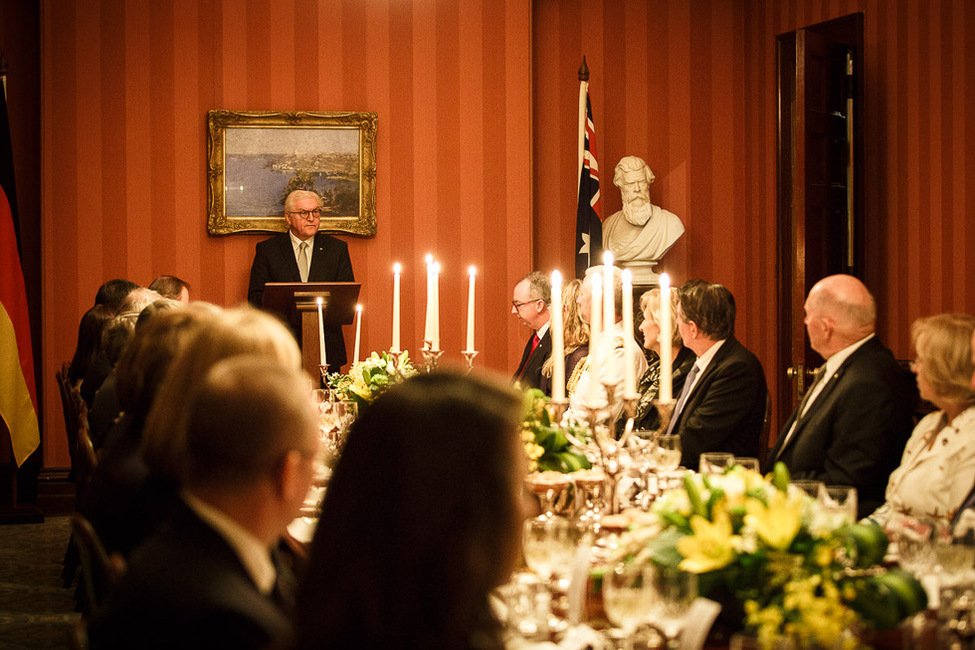Herr Jesu Christ, dich zu uns wend –
Lord Jesus Christ, be present now!
Two years ago, audiences across my country sat in awe as they listened to this German-Lutheran hymn from the 17th century. They had come to concert halls in towns such as Nördlingen, Zuffenhausen, Wiesbaden and Hildesheim to attend a very special performance. They probably recognised the melody – but the words were in an ancient language they did not understand, native to a far-away continent.
They had gone out to see the wonderful Central Australian Aboriginal Women's Choir, whose Boomerang Tour
in 2015 brought back to Germany what Lutheran missionaries had taken to Central Australia in the 19th century. And in case you’ve missed out on this experience, I can strongly recommend a recent Australian film called The Song Keepers
that traces the choir’s journey across Germany.
This cultural boomerang is a strong reminder of the historical ties that exist between our two countries. From Lutheran songs to the expeditions of Ludwig Leichhardt, Germans have had their impact on Australian culture and history. I am therefore exceedingly happy to be here today –as the President of Germany and as a first-time visitor to your wonderful country, but also as a German Protestant, and as a former MP for a constituency in Brandenburg, the very region Ludwig Leichhardt called home.
This is a meeting between friends, between reliable partners that share the same values. I am very happy that this friendship continues to thrive. The work of the Australia-Germany Advisory Group over the past few years gave significant momentum to the deepening of our bilateral relations in many areas – a development I strongly welcome.
In Germany, we value Australia as a beacon of stability in the Asia-Pacific, a region that is sometimes less stable than we all would wish. Operation RAMSI in the Solomon Islands, for example, is an impressive case of Australian leadership in the region. And we are both determined in our counter-terrorism efforts, from Australian support to the Philippines and Germany’s operation in Mali to our joint work in Afghanistan, to name just a few.
Germany is looking forward to deepening this co-operation as part of the 2+2 talks in 2018, and to the forthcoming climate change conference in Bonn under Fiji’s presidency. I am hopeful that the negotiations will send a strong signal specifically to the island nations of the Pacific, Australia’s neighbours, whose participation in Bonn we strongly welcome.
Visiting Australia once in their lifetime is a dream for many Germans. Nearly 200.000 of my countrymen and –women visit this continent every year, not to mention the more than 25.000 young Germans coming here for a Working Holiday. And let me add that my Bavarian compatriots always look forward to our Australian friends on their annual pilgrimage to the Oktoberfest in Munich.
We are also grateful that many Germans were able to find a new home in Australia, and I am very glad to see how they have contributed to building this country over the past 200 years. As a result, we can today look at a host of strong cultural, scientific and personal ties between individuals and organisations from our two countries.
To name just two examples, I want to highlight the recently launched Energy Transition hub and the long-running Scholarships for Australian-German Student Exchange. Nearly 100 years after the end of the First World War, programmes such as these serve as strong reminders for the value of understanding and exchange. This is something we can be proud of.
In its English lyrics, the ancient Lutheran hymn performed by the Central Australian Aboriginal Women's Choir finishes with the words: To Thee, O blessed Trinity, / Be praise throughout eternity! Tonight, however, I propose that we praise first and foremost the strong bond of friendship between our two countries: Please raise your glass with me – to you, Governor-general Cosgrove, Lady Cosgrove, and to the continued deepening of relations between Australia and Germany.
Please raise your glass with me – to her Majesty the Queen, and to the people of Australia.


